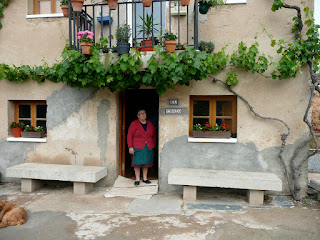 |
| Catherine, thankful for a rescue from the swollen Rio Valdearas, decides to end her pilgrimage on a high note. |
The next morning we packed up to head toward Logroño and, at the banks of the Rio Valdearas we watched as Connie, then Catherine were airlifted from an island in the swollen river. They both appeared happy, serene even. We shouted and waved to get their attention, but the noise of the helicopter was too loud and soon they were whisked off, over the horizon, to a local hospital.
We learned later that the fast waters coming off the hill in Viana had caught them, forcing them downhill and ultimately into the river. They'd spent the night on the island along with three French pilgrims who knew little English, but they shared French PowerBars for sustenance and, when they were spotted in the morning, a British pilgrim named Covey called for Search and Rescue. Later that night we had an e-mail from Connie, apologizing for a change of plans for the two, who had decided at the hospital that the walking, blisters, bunk beds, and occasional helicopter rescue didn't fit their idea of a vacation. Bye, Connie! Bye-bye, Catherine!
 |
| Lovely Logroño, capital of Spanish wine country and our overnight after the heroic rescue. |
We remaining pilgrims decided to walk a short day, with plans to challenge ourselves only with the 8 kms to Logroño, one of the great pilgrim towns of the Camino. As we crossed the Rio Valdearas we entered the autonomous region of La Rioja, Spain's internationally-famous wine country. We'd seen vineyards for many miles, but we realized now we had entered the heart of it all. We walked past the ruins of prehistoric city of Cantabria, then walked on asphalt path and back alleys to a beloved pilgrim rest stop -- the home of Feliza. For many years Feliza's aunt, also called Feliza, has welcomed pilgrims into her home and offered the hospitality of toast, jam, cafe, and fruit for an offering of a few coins each. We shared in her hospitality, had our credentiales stamped, then headed across the new bridge into the vibrant city of Logroño.
 |
| The original Feliza, shown here in 2008. Thanks, Cariña, for your care of 1000s of pilgrims over the years. |
This city of 130,000 is like a classy, Spanish version of Bellingham, Washington. The university brings a youthful vibe, the historic architecture brings a medieval feeling, and the Iglesia de Santiago marks it as a portion of Camino history. We noticed the statue of Santiago Matamoros (St. James the Moor-slayer) at Iglesia Santiago, reminding us of the story of Santiago's heroic and miraculous rout of the Moors in a nearby battle some 1,000 years after his death.
We caught dinner at the Plaza Mercado and then retired for the night at the municipal albergue -- after prayers of thanksgiving for the rescue of our friends, of course.
No comments:
Post a Comment